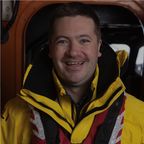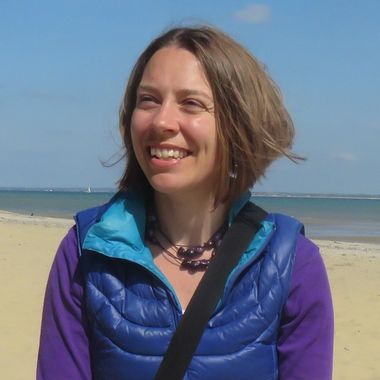
Dr Sophie Arana
The Alan Turing Institute





Dr Marcus Juniper
MET Office



Professor Caroline Rowland
Met Office






The Alan Turing Institute





MET Office



Met Office






National Oceanography Centre
Prof. Jenny Brown is a coastal oceanographer for the UK’s National Oceanography Centre, with expertise in wave, surge, tidal and storm impact modelling. More recently she has become involved with technology development to validate model capability and collect datasets to train Artificial Intelligence to better forecast coastal hazards. Her current research is focused on new wave overtopping hazard monitoring and prediction systems to support coastal management decisions and asses the resilience of coastal schemes as we move towards adaptive management solutions.
CEFAS
Tom is the Head of Applied Fisheries Research at Cefas. He is responsible for providing scientific and policy advice to government institutes including the UK Department of Environment Food and Rural Affairs (Defra). He is an active member of the International Council for the Exploration of the Seas (ICES), was a member of the EU Commission's Scientific, Technical and Economic Committee on Fisheries (STECF) prior to EU exit and Strategic Marine Policy Advisor to the UK Secretary of State for the Environment from 2020-22. Tom has extensive experience in participating and leading national and international research projects to better understand the interactions between commercial fishing activities and the marine environment with the aim to enhance the sustainability of fishing. This work is done in collaboration with many other partners, including science institutes, Universities, NGOs, and particularly the fishing industry.
President, IMarEST
Professor Stephen de Mora CSci CMarSci FRSA FIMarEST is the President of the IMarEST. Educated in chemistry and oceanography, he obtained a BSc from the University College of Swansea and a PhD from UBC, Vancouver. He has taught chemistry, environmental science, and oceanography at universities in the United Kingdom (University of Lancaster), New Zealand (University of Auckland) and Canada (Université de Québec a Rimouski). After a 20 year career in academia, he joined the International Atomic Energy Agency (IAEA) Marine Environment Laboratory in Monaco.
Through the IAEA, he worked with several Regional Seas Programmes and Global Environment Facility (GEF) projects around the world. Steve was awarded a Distinguished Service Award in the year that the IAEA was a co-recipient of the Nobel Prize in 2005. Before returning to the UK to take up the position at Plymouth Marine Laboratory (PML) in 2008, he had established an environmental consultancy based in Canada working for various UN bodies and the World Bank on assignment mostly in Eastern Europe, Western Asia and Central Africa. Steve has retired as the Chief Executive of both the Plymouth Marine Laboratory and PML Applications Ltd and now works as an independent environmental consultant.

ECMWF
Rachel Furner is a data-driven ocean modeller at ECMWF, where she is developing a machine learning-based global ocean model. This model will be used as part of a fully machine-learning based earth system model funded by the Destination Earth initiative.
Rachel has a strong foundation in mathematics and over a decade of experience in ocean modelling, having previously worked at the UK Met Office, contributing to the development and operational use of the NEMO physics-based model for storm surge and coastal ocean forecasting. She recently completed a PhD at the University of Cambridge and the British Antarctic Survey using machine learning to emulate idealised channel ocean configurations.

University of Exeter
Ajit Pillai is a Royal Academy of Engineering Research Fellow and Senior Lecturer at the University of Exeter. His research focuses on developing and deploying optimization algorithms and machine learning techniques to support the design and operation of offshore renewable energy systems. Through his ongoing fellowship, he is creating methods that integrate high-fidelity numerical models with targeted, dynamic measurement campaigns using autonomous vessels to improve marine safety and operational decision-making. This work aims to reduce environmental uncertainty and establish a novel spatial data framework for the marine environment.
Ajit has contributed to research projects applying optimization, machine learning, and advanced hydrodynamic modelling to offshore systems. His recent work includes metocean forecasting, offshore wind farm layout optimization, mooring system design, and the use of autonomous platforms for data collection. His research interests lie in combining digital tools and physical modelling to accelerate innovation in offshore renewables.

Co-chair IMarEST Operational Oceanography SIG
Ralph is a Professorial Research Fellow in the Department of Statistics at LSE as well as holding a position with The U.S. National Oceanic and Atmospheric Administration. He is a fellow of the Institute for Marine Engineering, Science and Technology, the Society for Underwater Technology, the Marine technology Society, the Royal Meteorological Society and the Royal Society of Arts, Manufactures and Commerce.
Ralph’s academic background is in ocean science and technology. Throughout his career he has worked at the interface between the public and private sectors in meeting the need for monitoring of the ocean environment in support of understanding climate change, the use of ocean resources and the protection of the marine environment. He is a former chair of the IOC/UNESCO Global Ocean Observing System Steering Committee and currently serves on the advisory bodies of a number on leading ocean science research organisations, including Plymouth Marine Laboratory and the Schmidt Ocean Institute. He is Editor in Chief of the Journal of Operational Oceanography and is a founding trustee of the Rising Seas Institute.

National Oceanography Centre
Prof. John Siddorn is the Chief Executive of the National Oceanography Centre (NOC), where he leads the organisation’s mission to gain a deeper knowledge of the ocean to address major challenges facing society and the natural world.
Under his leadership, NOC is driving innovation in digital ocean technologies, autonomous systems, and data-driven science for the benefit of society and the planet, positioning the UK at the forefront of global marine research and environmental resilience.
John is the Head of the UK Delegation to the International Oceanographic Commission of UNESCO, an Honorary Fellow at the Met Office and a Fellow of the Alan Turing Institute. He Chairs the interim Executive Committee of Marine Science UK, is on the UN Decade Digital Twins of the Ocean (DITTO) Advisory Board and the Ad Hoc Committee supporting the development of OceanObs ’29.
Before becoming Chief Executive, John served as NOC’s Chief Scientist, where he guided the organisation’s research. Earlier in his career, he held senior roles at the Met Office, including Head of Ocean Forecasting R&D, and began his research journey at Plymouth Marine Laboratory as a biogeochemical modeller.

Plymouth Marine Laboratory
Jozef’s background (including PhD) is in theoretical and mathematical physics. After spending three years as postdoctoral researcher in theoretical physics, Jozef has spent the last decade at Plymouth Marine Laboratory (PML), for nine past years closely collaborating with the Met Office on developments in marine biogeochemistry data assimilation. This work has directly fed into the Met Office operational and reanalysis system for the UK regional seas biogeochemistry. In addition to data assimilation, in the last years Jozef has led PML work activities in the area of machine learning applications in modelling and data assimilation, as well as in the field of bio-optical modelling. On a national level, Jozef is a co-chair of National Partnership for Ocean Prediction’s Marine Data Assimilation group and lead for PML science in the National Centre for Earth Observation.

British Antarctic Survey
Dr Jonathan Smith is the Deputy Science Leader of the AI Lab at the British Antarctic Survey (BAS) and leads a team in developing AI systems for decision support in marine planning. The AI decision support systems allows operational planning experts to tap into cutting edge solutions that define ways to coordinate large fleets of ships and autonomous vehicles to maximise data collection whilst minimise carbon cost. On top of this work BAS is developing cutting edge machine learning solutions for marine vessel optimal route planning in changing environmental solutions and forecasting of environmental variables (e.g. Sea-Ice). Prior to joining BAS Jonathan was an invited research fellow at California Institute of Technology, and during this position he developed cutting edge machine learning software for the real-time monitoring of Southern California earthquakes.

MET Office
Edward is the Met Office IT Fellow for Data Science, championing the development and delivery of the organisation's artificial intelligence and machine learning capability. Consistent with his expertise in environmental intelligence, and many years of leading high-impact applied scientific contributions across academia, industry and government, is his enjoyment of working with both internal and external partners to enable them to see around corners and ensure they capitalize on new and emerging technological improvements; unlocking new opportunities for radically enhanced weather and climate related decision-making.
Career background
Edward joined the Met Office in December 2015 as a scientist in the Post-Processing Applications team. From July 2019, while still continuing to lead the scientific application of forecasts within the commercial marine sector, he managed a team within the Aviation area on an interim basis for nine months, prior to founding (and growing) the Marine Applications team; with his personal impact credited with helping substantially de-risk multi-million-pound operations, ensuring the safety of life at sea, and evolving sector-wide standards (and aspirations) for the use of these data.
His background includes a PhD in Marine Physics and a Postdoctoral Research Fellowship in Physical Oceanography, both at the University of Plymouth, as well as significant contributions to the wider field of operational oceanography spanning multiple international learned society, journal editorial, joint industry project and cross-government Agency advisory roles.

PhD researcher, King's College London
Madeleine Waller is a PhD researcher at King's College London in the UKRI Safe and Trusted AI Centre for Doctoral Training. She is also currently and Enrichment Student at The Alan Turing Institute. Her research focuses on the fairness of automated decision-making systems. Before her PhD studies, Madeleine received a First Class (Honours) Computer Science BSc at King's College London. Madeleine's main interest is in AI policy, specifically around preventing the use of discriminatory AI systems.Please accept {{cookieConsents}} cookies to view this content